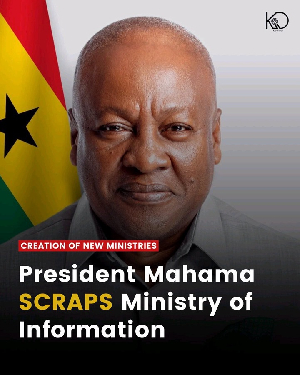
Ghana's new government has made an unexpected announcement by announcing a list of 23 ministries, notably leaving out the Ministry of Information. This revelation has caused a great deal of conjecture and prompted questions over the administration's transparency and communication policies.
Since the Ministry of Information is the primary means of informing the public about government policies, programs, and updates, it has historically played a crucial role in governance. Many are curious about the government's plans for managing its communication strategy and preserving open communication with citizens in light of its exclusion from the updated list of ministries.
Since the Ministry of Information's exclusion has not been formally justified, a flurry of inquiries from the public, political analysts, and media players have been raised. "To ensure that governance is transparent, the Ministry of Information is essential. Without it, people are unsure of how the government would educate them, according to a political analyst on a nearby radio station.
Discussions concerning the ramifications of this omission have been flying across social media. While some users have decried the move, arguing that it is a step backward in terms of maintaining accountability, others have conjectured that the government would use different channels for communicating with the people.
Communication between the government and its citizens must be clear and constant for effective governance to exist. In the absence of a specialized Ministry of Information, interested parties worry about possible lapses in public involvement and information distribution.
By clearing up misunderstandings and offering clarification on policies, the Ministry of Information has served as a liaison between the public and the government. During a panel discussion, one journalist said, "Its absence has me wondering how this important function will now be handled."
There is increasing pressure on the administration to lay out its plans for handling media relations and communication as Ghanaians wait for more information. Stakeholders are demanding guarantees that accessibility and openness would continue to be top priority as well as a thorough justification for the decision.
Effective communication is crucial to governance, as demonstrated by the Ministry of Information's exclusion. The task for the incoming government is to make sure it satisfies the public's expectations for engagement, openness, and transparency as they look for solutions.